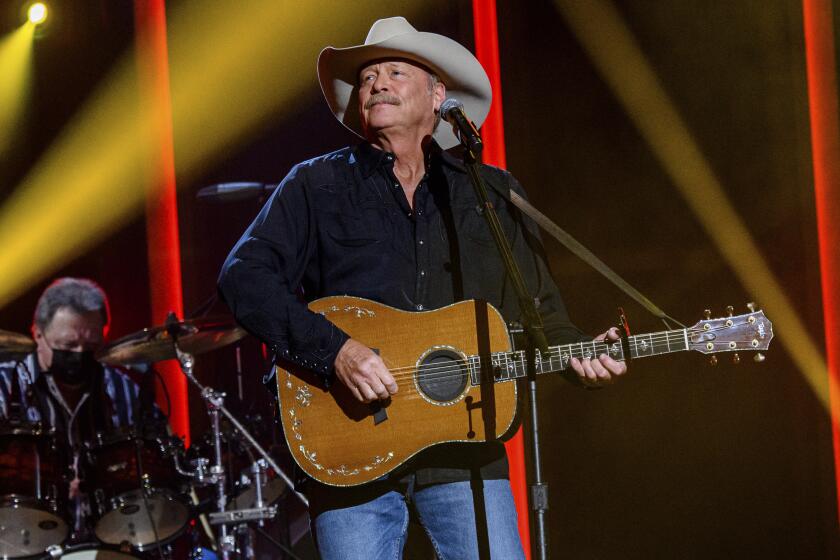SAMPLE & CRUSADERS ON THE UPSWING
- Share via
The last five years have been tough going for pianist Joe Sample, mainly because he’s been traveling to the beat of different drummers.
In 1983, drummer Nesbert (Stix) Hooper left the Crusaders, the contemporary jazz group that Hooper, Sample, tenor saxophonist Wilton Felder and trombonist Wayne Henderson founded in Houston in the early ‘50s, and which has been known by such names as the Night Hawks and the Jazz Crusaders. Sample, who currently shares leadership with Felder (Henderson left in 1976) and who also does the hiring and firing, has had a hard time replacing Hooper.
“He was my favorite drummer and he was my best friend,” Sample said by phone from a New York tour stop. “He suffered a personal loss and he decided he didn’t want to keep playing with the band. I was completely unprepared for his leaving.”
Sample recalled the way it used to be. “When Stix played drums and Wilton (doubled on) bass, that was heaven,” he exuded. “We had played together for so long, that we all thought alike, felt alike, musically. We came from the same era.”
Sample said that at the time he “would have liked to have re-formed the band, but we had a lot of commitments, so we had to keep going. I had to hire drummer after drummer--I must have gone through 40 of them. As a result, there have been a lot of nights when (the performance) didn’t go easily. In fact, there were many nights when it was just plain bad.”
Happily, Sample feels the worst is over and his new band--which plays the Hollywood Bowl Sunday and which features Scott Peaker, drums, John Pena, bass, David T. Walker, guitar, Eddie Davis, trumpet, Lenny Castro, percussion, and Reichi Guillery, vocals--is more to his liking. “We’re on the upswing now,” he said. “Actually, the last couple of groups, with Sonny Emery and now Scott on drums, have been good. We’re definitely moving in the right direction.”
One of Sample’s major problems has been getting the rhythm section to come up with the feeling that the 48-year-old pianist says works best for modern instrumental music.
“The rhythm is a big thing, and I have a personal concept of what it should be,” said Sample. “So I need to feel that rhythm with my partners. My rhythmic basis is a mixture of rhythm and blues and be-bop, as well as that groove that happened in the ‘50s with people like Wynton Kelly and Bud Powell. A lot of the young players I have worked with think jazz started with John Coltrane. But both Scott and Sonny not only understand new music, but older forms as well.”
Sample described his rhythmic point of view: “I want the music to go forward. This means you have to play on the front edge of the beat, which creates that forward thrust. I have found that a lot of players don’t understand this and sometimes they’ll play even on the back part of the beat, which can actually cause the music to slow down.”
With Davis’ trumpet in the front line alongside Felder’s tenor, there’s a hearkening back to the Crusaders’ original sound, which blended Henderson’s trombone with the sax. But Sample says that the horns will play a new, or at least altered, role.
“I don’t think we have to have that trumpet-tenor sound everywhere on every tune,” he said. “That’s just one way of making a melody work. When we started, we had that trombone-tenor sound, that was reminiscent of (drummer) Art Blakey’s band. Then we got away from that by blending guitar and tenor. Now it’s different again.”
Still, the band will be based around its original concept, “which has been jazz and rhythm and blues and Latin,” said Sample. “We play be-bop, and while it’s not be-bop per se, still there is some of that be-bop feeling in almost all of what we do. We were among the first to blend be-bop and rhythm and blues. We had that fire.”
Outside of the Crusaders, Sample has a career as a solo pianist; his latest album is “Roles” (Crusaders/MCA). It reminds him of “Carmel,” an earlier solo project. “ ‘Carmel’ was my favorite record, and I feel that ‘Roles’ is my best one since,” said Sample, a man not given to boasting. “It has that together group feeling where everybody is listening to, and playing with, each other.”
The Crusaders have maintained a following since their recording debut in 1961, and that pleases the pianist. “I listen to radio stations around the country and in Europe and Japan, and I hear our earliest records being played,” he said. “To have that kind of popularity, that kind of acceptance, is wonderful. It gives me a good feeling to know that the music I have made will last after I have gone.”
More to Read
The biggest entertainment stories
Get our big stories about Hollywood, film, television, music, arts, culture and more right in your inbox as soon as they publish.
You may occasionally receive promotional content from the Los Angeles Times.










